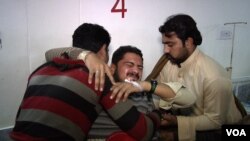Authorities in Pakistan have arrested the suspected main facilitator of last month’s attack on a university that killed at least 21 people, mostly students.
Intelligence sources confirmed to VOA on Wednesday that security operatives detained the suspect from an area not far from the northwestern town of Charsadda, where four heavily armed militants stormed the Bacha Khan University on January 20 and carried out the massacre. All of the assailants were killed in a four-hour gun battle with security forces inside the university.
The English-language DAWN newspaper has identified the suspect as Waheed Ali, alias Arshad, saying his arrest took place last week in Nowshera, a city near Charsadda, while he was attempting to flee to Afghanistan.
"He had shaved his beard and packed up. His [hired] taxi was intercepted and he was picked up after positive identification," the paper reported, adding that Arshad is in his 30s and has confessed to his crime.
Fugitive commander implicated
The detainee told interrogators that a fugitive Pakistani militant commander, Khalifa Umar Mansoor, planned and ordered the attack from his suspected base in the Afghan border district of Achin, sources said.
The Pakistani military announced the arrest a week ago of five other people who allegedly facilitated the deadly university assault. Officials at the time claimed to have intercepted telephone conversations between the attackers and their alleged handler in Afghanistan, namely Mansoor.
The militant commander, who heads a splinter faction of the Pakistani Taliban, claimed responsibility in a video message released to the media a few days after the attack. He identified the four men accompanying him in the video as the university attackers.
In his video message, Mansoor also threatened to carry out more such attacks, prompting educational institutions across the country to close until early this week.
Bitter memories
The university attack revived memories of the December 2014 militant raid on an army-run school in the nearby city of Peshawar, in which 150 people, mostly children, were massacred.
The main Taliban organization, Tehreek-e-Taliban Pakistan or TTP, had claimed responsibility for that violence but has denied any involvement in the university attack.
Afghanistan’s Achin district, according to U.S. and Afghan officials, is serving as the main base for regional militants linked to the Islamic State militant group.
The Afghan district and surrounding areas in eastern Nangarhar province have increasingly become a security challenge for authorities already struggling to tackle the resurgent Taliban insurgency.
Earlier this week, a joint Afghan-U.S. air assault on Achin destroyed an Islamic State radio station and killed 29 of its fighters, according to provincial officials.
U.S. military commanders acknowledge that fugitive Pakistan Taliban extremists fleeing military offensives on the other side of the border have joined forces with IS in restive Nangarhar.













